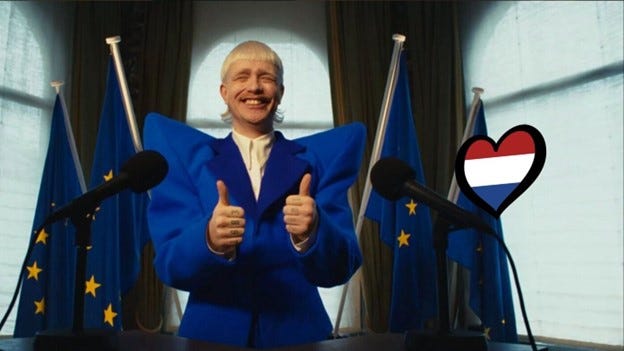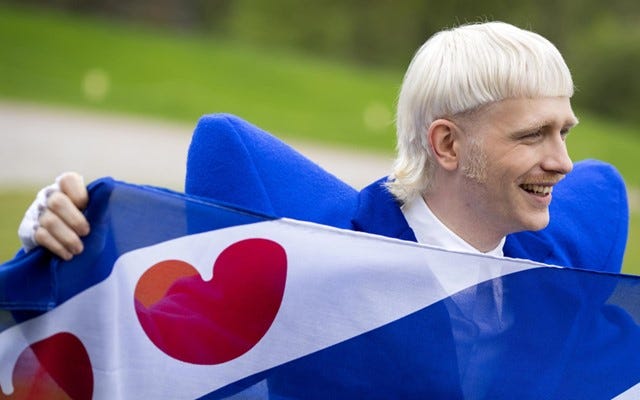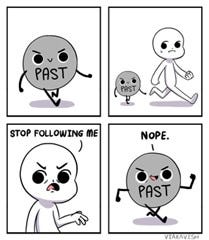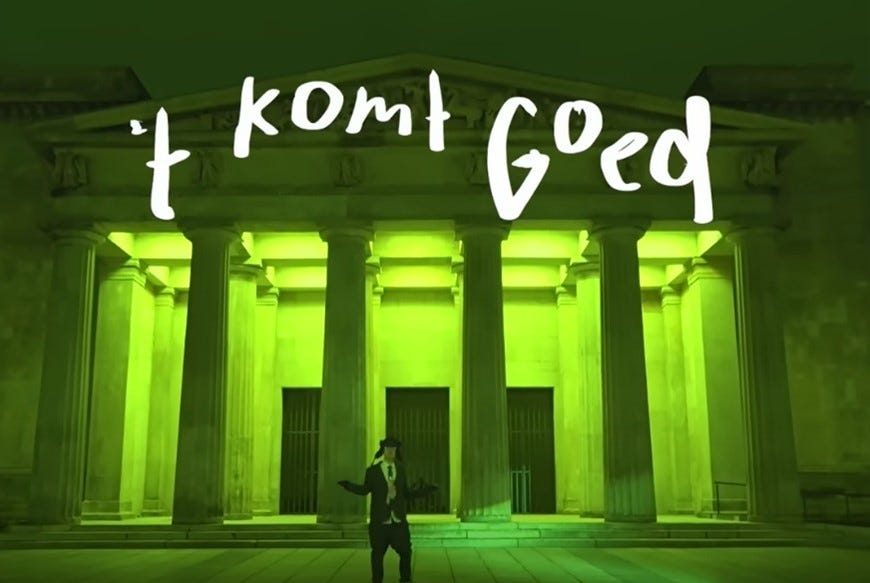Joost Klein: Beyond the Europapa Phenomenon
Recently, I became enthusiastic about analyzing as many songs as possible by my current favorite Dutch artist, Joost Klein. However, as I began interpreting the second song, something felt off. Even though I enjoyed the process, I couldn't help but feel like I was revealing a magician’s tricks. So, I made the rational decision to stop. Explaining the lyrics to death and taking away people's sense of wonder and curiosity wasn't on my to-do list. Instead, I thought it would be better to share why the artist in the oversized International Klein Blue suit has had such an impact on me.
To provide some context before diving deeper, I must confess that I had grown disinterested in Eurovision in the recent years. When my sister-in-law began posting about the Dutch contestant for 2024 months in advance, I tried my best to ignore it. However, by the third mention, curiosity got the best of me, and I decided to give it a chance, albeit reluctantly. Honestly, I expected an over-the-top, meaningless party song. Instead, I realized how judgmental I had been. Life is full of surprises!
The song Europapa gave me an unexplainable pang in the heart almost instantly. The melody was strangely sad and melancholic, yet the beat was… upbeat? The contradiction intrigued me. Since the song was in various languages, I looked up the lyrics and found some of the most soul-crushing lines I've encountered in a while: Ich bin in Deutschland, aber ich bin so allein/ Io sono in Italia, maar toch doet het pijn/ 'k Ben aan het vluchten van mezelf, roep de hele dag om help (I’m in Germany, but I’m so alone/ I’m in Italy, but it still hurts/ I’m running away from myself, begging the whole day for help).
Why did it have such an effect on me? It had a lot to do with the way Joost Klein expressed himself—through the lyrics, mannerisms, and especially voice intonation. It all felt so recognizable. It hit home. It reminded me of my own pain that I tried to pretend wasn’t there. I moved to the other side of Europe to avoid it, and no matter how far I was from my home country, Romania, the pain stubbornly remained, stuck on repeat like an annoying Katy Perry song on the radio.
I remember being around seven, holding my favorite toy, sobbing, and telling myself that my future would be different and that I’d never have to suffer again as I did then. I had this clear vision that if only I could live somewhere else, everything would be different, including me. I thought if I made different plans, meet new people, have my own career and home that it would somehow make the past disappear into oblivion. Later, I found out that “Wherever you go, there you are” is not only a quote but also a reality.
After seeing the video and learning about the tragic loss of his parents at a young age, I instantly gained respect for Joost Klein's attitude towards life. Here was someone who didn’t bemoan his past or seek sympathy, yet he also didn’t pretend that his experiences hadn’t affected him. Instead, he showed another way to deal with it: embracing his pain and transforming it into art. There’s something profoundly moving about the human spirit’s ability to overcome challenges in this manner. It can melt even the most cynical heart and restore a bit of hope in humanity. I know it did in my case.
Little did I know that Europapa was only the beginning. Ever since March 2024, I proceeded to obsessively listen to his entire discography, and I think I’m not the only person who now has found something addictively relatable in his music. I’d like to explore some of the reasons I believe Joost Klein’s music and art is here to stay for a long time:
Authenticity
There are a lot of discussions about authenticity, but honestly, where is it?
When I listen to new music, I often find it difficult to distinguish one artist from another because so many of them have a similar sound. It's simply background noise. Despite better audio and video quality and more impressive stage setups, there are few glimpses of the artist's true self in their music. Their unique voices seem drowned in perfected vocals and well-timed choreographed performances. There's little soul or heart in their art, and the audience can feel it too.
What Joost Klein does remarkably well is embrace every aspect of himself and present it to his audience unfiltered. His song Fryslân Bop is a prime example of this authenticity. The song includes several Frisian references, such as the Elfstedentocht, the world’s largest ice-skating marathon, typically held in Friesland. For more information, check out Everything You Need to Know About the Netherlands' Elfstedentocht. Another reference is the name Tjeerd, which gives it an extra taste of the Frisian culture.
Additionally, Joost frequently displays the Frisian flag in his performances and interviews, underscoring his pride in his heritage. This is also evident in his lyrics: Een andere provincie vind ik minder mooi/Jouw gemeente en bestuur dat is een teringzooi (Other provinces are less nice/ Your municipality and governing body are a mess"). Ouch!
Embracing the past
If you search the internet for advice on how to deal with the past, you’re often told to just let it go and focus on the present. However, few offer guidelines or steps on how to achieve this. So, what can you do when the past looms over you like an insecure micromanager constantly watching your every move? The solution is simple, but not easy: accept the past for what it is and find a way to integrate it without allowing it to overshadow the present. It's similar to accepting that life includes both day and night—each has its place, and neither should dominate the other.
Joost Klein does something similar in his performances, mixing both light and dark. Everyone who has seen his shows, either live or online, knows that he's very a dynamic presence on stage, full of energy. Yet, in many of his shows, he saves one of his most touching songs, Florida 2009 for the end. At this point, the atmosphere shifts to a quieter, more reflective mood, allowing the song to receive the contemplation it deserves.
He opens with the lines: Na al die tijd van vluchten/ Sta je stil en denk je na (After all the time running away/ Sit still and think about it), signifying the need to pause and reflect on the most traumatic events in his life: the deaths of both of his parents. He begins by recounting the loss of his father, sharing small, happy moments they had together, which have now taken on greater significance due to their irreversibility. He then speaks of his mother, recalling the sight of people crying at her funeral. The shock and trauma prevent him from finding solace in their grief, leading him to emotionally dissociate and grow colder over time as a coping mechanism for his new reality.
Joost Klein closes powerfully with the lyrics, "Maar heb een steen verlegd in de rivier/ En dat ondanks alle regen" (But I have moved a stone in the river despite all the rain), illustrating his capacity to act despite life's challenges. This action isn't quick or drastic, but gradual—step by step, or stone by stone. Building a new and better future requires a strong foundation, which can take months or even years. You can watch his performance here: Florida 2009 (LIVE at Pinkpop)
Confidence
There are countless messages encouraging us to be ourselves and find strength in our uniqueness. But what do you do when all you feel is shame about who you are, and attempts to show your true self have been met with ridicule or even abandonment? I don’t have all the answers, but I believe that observing or being around genuinely confident people can reignite that inner spark and help some of us move forward.
Joost Klein is a prime example of this. His infectious enthusiasm and high energy can uplift even the most self-conscious people. For me, his performance this year in Tilburg rekindled that childlike joy I once felt dancing with my father at home parties— when I was so immersed in the moment and the music that I didn’t worry about who was watching. Nowadays, I’m often caught up in my own thoughts, so I was amazed to find myself singing his songs at the top of my lungs and dancing with the same energy and enthusiasm I thought I lost. It truly felt like magic.
Another aspect that touched me was Joost's frankness about his ongoing struggles with anxiety. Despite his confident and relaxed demeanor, he openly admitted in one of his interviews in 2018 the following: "Ik ben elke dag bezig om mijn beste ik te zijn, terwijl ik weet wat voor paniekerige guy en stresskip ik ben. Elke dag probeer ik over die angst heen te gaan." (I am working every day to be my best self, knowing what a panicky and stressed-out guy I am. Every day I try to get over that fear.) Knowing that someone I look up to is experiencing a similar inner turmoil, but takes action in spite of it, makes it easier for me to also pursue my own dreams and to feel more comfortable in my own skin. Link to interview, only in Dutch: LL18: Joost is dom op een slimme manier.
Discovering Joost Klein's music has helped me in so many ways. Not only did it give me a gentle nudge to improve my Dutch language skills but also showed me how to process my emotions in healthier ways and gave me the confidence to start writing again. Though this is still a work in progress, I am learning to trust the process. I hope that whatever creative endeavor you are on, you learn to do the same.







